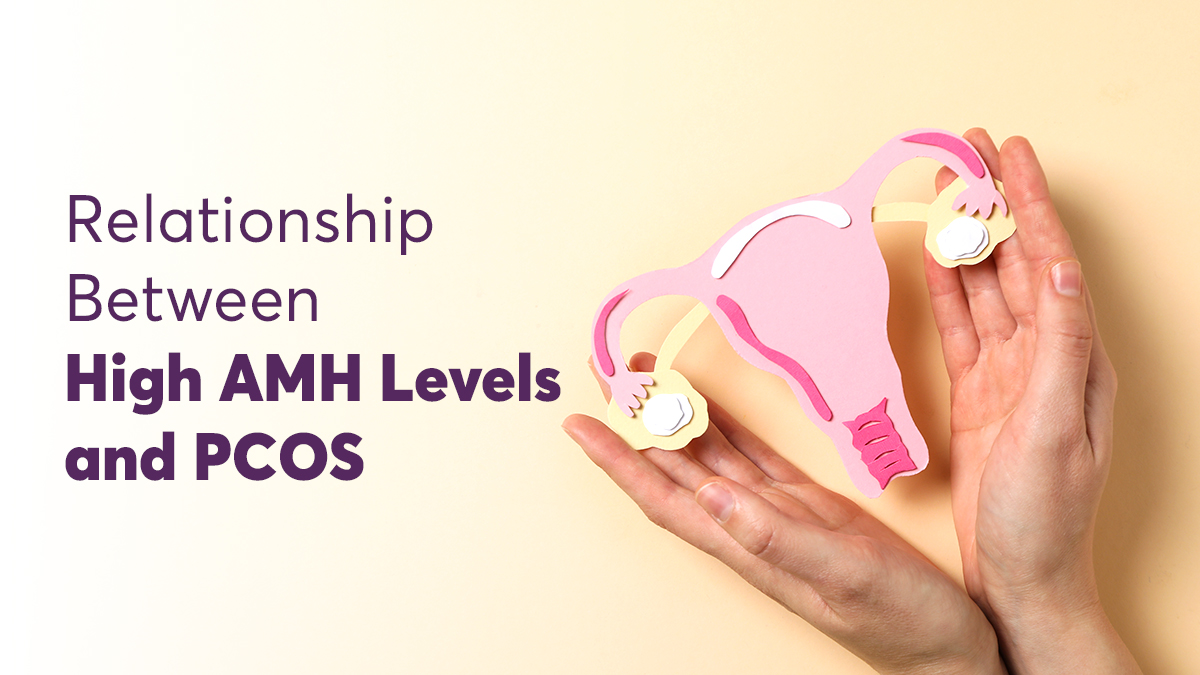
Relationship Between High AMH Levels and PCOS

You and your partner may be emotionally ready to start a family. In such a scenario, difficulty in conceiving can be extremely overwhelming, especially if you’ve been trying for a long time. Fortunately, there are assisted reproductive technologies (ART), of which the most effective is IVF. If you’ve been dreaming about holding your baby in your arms, it’s important to know about fertility assessments like checking AMH levels as well as the relationship between high AMH levels and PCOS.
What is AMH?
AMH, or Anti-Müllerian Hormone, is a glycoprotein (carbohydrate + protein) hormone that is produced by the cells surrounding the eggs in your ovaries. This hormone plays a key role in your reproductive development and high AMH levels are considered a sign of fertility. You may have many questions. Here are quick answers to some most asked ones.
How do AMH levels show fertility?
The secretion of AMH is considered the most important biomarker of your ovarian reserve, or the number of eggs present in your ovaries. Your ovaries have follicles (small pouch-like cavities) that contain the eggs. Each follicle is home to only one egg. When the eggs are not mature, the granulosa cells in your ovaries secrete AMH. These are the same cells that produce hormones like oestrogen. Since the follicles develop continuously as you go through your menstrual cycle, AMH levels are considered the most stable indicator of the number of eggs in your ovaries.
How are AMH levels measured?
It involves a blood test. The concentration of AMH in your blood sample measures the number of eggs present in your ovaries. The test can be conducted anytime during your menstrual cycle, since AMH levels remain almost constant.
What are normal AMH levels?
AMH levels are measured in nanograms per millilitre (ng/mL). A normal range is difficult to define because AMH levels vary with age. They rise from puberty to around 25 years, after which they naturally begin to decline.
Broadly speaking, medical professionals consider the average or normal range to be between 1.0 ng/mL to 3.0 ng/mL.
Some categorise as:
- Normal: 1.5 to 4.0 ng/ml
- Low Normal: 1.0 to 1.5 ng/ml
- Low: 0.5 to 1.0 ng/ml
- Severely Low: Under 0.4 ng/mL
- High: Above 4.0 ng/ml
What about high AMH levels?
There are 2 main causes of high AMH levels. These results indicate you have more eggs available for fertilization. However, they are also indicative of polycystic ovary syndrome (PCOS).
AMH and PCOS: Understanding the Connection
If you’re suffering from PCOS, there could be a larger number of follicles or increased follicular secretion. This is what makes PCOS one of the main reasons for high AMH levels among women of childbearing age.
Implications of High AMH Levels
There are 2 considerations when your tests indicate high AMH levels:
- Fertility Challenges: Too much AMH prevents the follicles from releasing the eggs even when they are ready. This means high AMH secretion can prevent ovulation.
- Long-term Health Concerns: The high AMH levels that accompany PCOS increase the risk of insulin resistance, type 2 diabetes, and cardiovascular diseases.
Diagnosing PCOS with AMH
It’s usually very difficult to diagnose PCOS. This is because you may not experience any symptoms of this condition. Sometimes, the symptoms are mistaken for those experienced during puberty, as they are similar. Also, PCOS symptoms differ vastly depending on your age, genetics, and other health conditions. In this scenario, one test that can indicate PCOS is checking for AMH levels.
If your AMH levels are high, your doctor may recommend further investigation, which could be an internal ultrasound scan to check for cysts in your ovaries.
Managing High AMH Levels in PCOS
There are some ways to lower your high AMH levels when diagnosed with PCOS. It’s best to consult your healthcare professional about high AMH treatment before beginning with these methods.
Exercise
Exercising is great for keeping your hormones in balance, reducing insulin resistance, and increasing blood circulation in the ovaries. All these factors work together to control your AMH levels and PCOS. You could try yoga, walking, cycling, or swimming as these involve moving your whole body.
Balanced diet
This can lower insulin resistance and inflammation, while improving your hormone balance and overall health. Replace sugary and processed foods with proteins, healthy fats, and vegetables.
Reduce stress
Stress is among the main causes of hormonal imbalance and high AMH levels. Yoga and meditation can help lower stress, as can getting restful sleep and spending time doing things you love.
Stay hydrated
This improves blood circulation and prevents the formation of cysts.
Apart from making these lifestyle changes, your doctor may suggest medical treatment for high AMH levels and to regulate your menstrual cycles.
The Way Forward
The right knowledge and guidance from experienced healthcare professionals can improve your overall reproductive health and chances of conceiving. A blood test to measure AMH levels plays an important role in this. Knowing your ovarian reserve can help your doctor better plan the IVF procedure or high AML levels can prompt further investigation for PCOS. Experiencing irregular periods, acne, excess hair growth, or difficulty conceiving? These could be symptoms of abnormal AML levels. Don’t delay in consulting a doctor.


fill up the form to get a
Free Consultation
Avail 0% interest on EMI
All Procedures | No Upper Limit
Frequently Asked Questions
Is it possible to get pregnant naturally with a high AMH level?
Does high AMH mean PCOS?
Does high AMH levels cause twins?
When is AMH level highest in the menstrual cycle?
How we reviewed this article:
- Current Version
- August 1, 2024 by Oasis Fertility
- June 26, 2024 by Oasis Fertility






